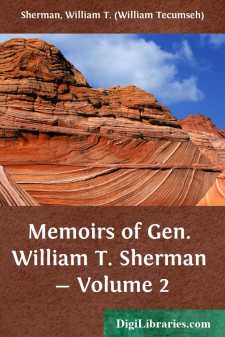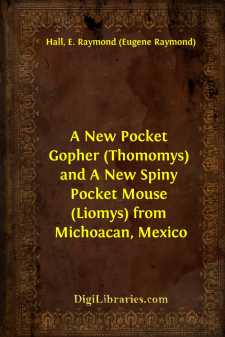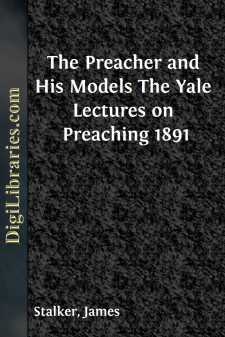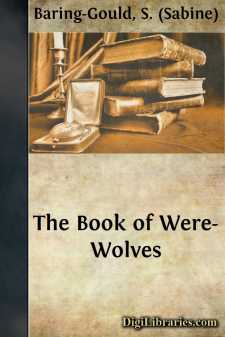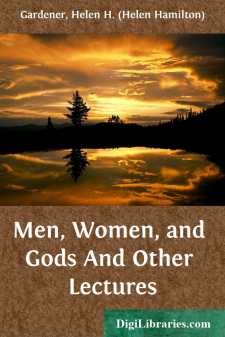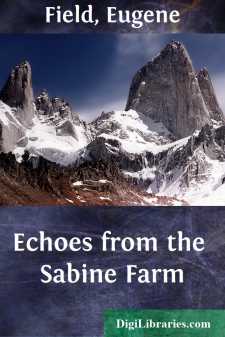Non-Classifiable
- Non-Classifiable 1768
Non-Classifiable Books
Sort by:
MARCH, APRIL, AND MAY, 1864. On the 18th day of March, 1864, at Nashville, Tennessee, I relieved Lieutenant-General Grant in command of the Military Division of the Mississippi, embracing the Departments of the Ohio, Cumberland, Tennessee, and Arkansas, commanded respectively by Major-Generals Schofield, Thomas, McPherson, and Steele. General Grant was in the act of starting East to assume command of...
more...
A series of 17 pocket gophers of the species Thomomys umbrinus obtained in 1943 from points 3, 4 and 5 miles south of Pátzcuaro proves upon comparison to be an hitherto unrecognized subspecies which is described and named as follows: Thomomys umbrinus pullus, new subspecies Type.—Male, adult, skin and skull; No. 100151, Univ. California Mus. Vert. Zool.; 5 mi. S Pátzcuaro, 7800 ft., Michoacán,...
more...
by:
James Stalker
LECTURE I. INTRODUCTORY. Gentlemen, it would be impossible to begin this course of lectures without expressing my acknowledgments to the Theological Faculty of this University for the great honour they have done me by inviting me to occupy this position. When I look over the list of my predecessors and observe that it includes such names as Bishop Simpson, Henry Ward Beecher, Dr. John Hall, Dr. W.M....
more...
CHAPTER I. EARLY LIFE AND EDUCATION. When we speak, in the language of our title-page, of the 'Ancient Classics', we must remember that the word 'ancient' is to be taken with a considerable difference, in one sense. Ancient all the Greek and Roman authors are, as dated comparatively with our modern era. But as to the antique character of their writings, there is often a difference...
more...
by:
Calvin Coolidge
NOTE TO SECOND EDITION In the issue of a second edition of this collection of Governor Coolidge's speeches and messages, the opportunity has been taken to add a proclamation and three recently delivered addresses, which bring the volume practically up to the date of publication. Boston, October, 1919 The Commonwealth of Massachusetts. By His Excellency CALVIN COOLIDGE GOVERNOR A PROCLAMATION...
more...
NATURAL CAUSES OF LYCANTHROPY. Innate Cruelty--Its Three Forms--Dumollard--Andreas Bichel--A Dutch Priest--Other instances of Inherent Cruelty--Cruelty united to Refinement--A Hungarian Bather in Blood--Suddenness with which the Passion is developed--Cannibalism; in pregnant Women; in Maniacs--Hallucination; how Produced--Salves--The Story of Lucius--Self-deception. WHAT I have related from the...
more...
INTRODUCTION. Nothing gives me more pleasure, nothing gives greater promise for the future, than the fact that woman is achieving intellectual and physical liberty. It is refreshing to know that here, in our country, there are thousands of women who think and express their own thoughts—who are thoroughly free and thoroughly conscientious—who have neither been narrowed nor corrupted by a heartless...
more...
by:
Eugene Field
INTRODUCTION One Sunday evening in the winter of 1890 Eugene Field and the writer were walking in Lake View, Chicago, on their way to visit the library of a common friend, when the subject of publishing a book for Field came up for discussion. The Little Book of Western Verse and The Little Book of Profitable Tales had been privately printed the year before at Chicago, and Field had been frequently...
more...
CHAPTER I. The Discovery and early Settlement of America. Discovery of the New World.—Of Florida.—Conquest and cruelties of De Soto.—The wigwam.—Colony at St. Mary.—Sir Walter Raleigh and his Colonies.—Grant of King James.—Settlements in the Virginia.—Adventures of John Smith.—Arrival of Lord Delaware.—Terrible massacres.—Pressures of Colonists to the West.—Doherty Trade with...
more...
CHAPTER I THE HOUSE OF BONDAGE For a considerable number of years I had been a resident in London, which city I regarded alternately as my Paradise and my House of Bondage. I am by no means one of those who are always ready to fling opprobrious epithets at London, such as 'a pestilent wen,' a cluster of 'squalid villages,' and the like; on the contrary, I regard London as the most...
more...


